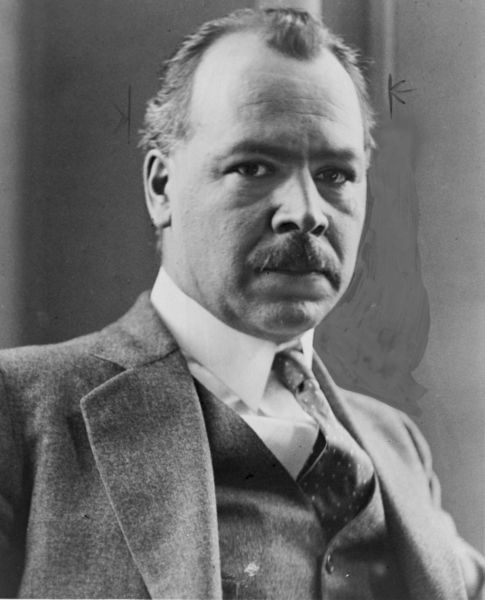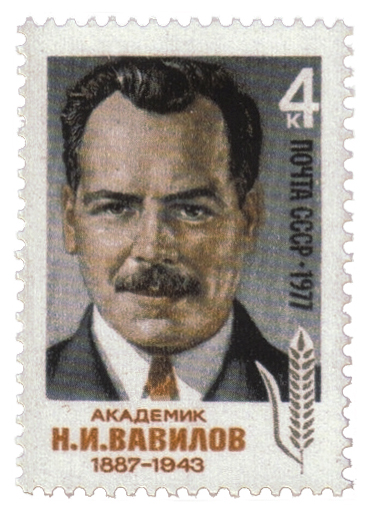<Back to Index>
- Botanist Nikolai Ivanovich Vavilov, 1887
- Writer Li Yaotang (Ba Jin), 1904
- Dictator of Chile Augusto José Ramón Pinochet Ugarte, 1915
PAGE SPONSOR


Nikolai Ivanovich Vavilov (Russian: Никола́й Ива́нович Вави́лов) (November 25 [O.S. November 13] 1887 – January 26, 1943) was a prominent Russian and Soviet botanist and geneticist best known for having identified the centres of origin of cultivated plants. He devoted his life to the study and improvement of wheat, corn, and other cereal crops that sustain the global population.
Vavilov was born into a merchant family in Moscow, the older brother of renowned physicist Sergey Ivanovich Vavilov. He graduated from the Moscow Agricultural Institute in 1910 with a dissertation on snails as pests. From 1911 to 1912, he worked at the Bureau for Applied Botany and at the Bureau of Mycology and Phytopathology. From 1913 to 1914 he travelled in Europe and studied plant immunity, in collaboration with the British biologist William Bateson, who founded the science of genetics.
From 1924 to 1935 he was the director of the All-Union Institute of Agricultural Sciences at Leningrad.
While
developing his theory on the centres of origin of cultivated plants,
Vavilov organized a series of botanical - agronomic expeditions, collected seeds from every corner of the globe, and created in Leningrad the world's largest collection of plant seeds. This seedbank was diligently preserved even throughout the 28 month Siege of Leningrad,
despite starvation; one of Nikolai's assistants starved to death
surrounded by edible seeds. Vavilov also formulated the law of
homologous series in variation. He was a member of the USSR Central Executive Committee, President of All-Union Geographical Society and a recipient of the Lenin Prize. During most of his career Vavilov was assisted by his deputy Georgy Balabajev. Vavilov repeatedly criticised the non-Mendelian concepts of Trofim Lysenko.
As a result, Vavilov was arrested on August 6, 1940 and died of
malnutrition in a prison in 1943. According to Cohen, by 1940, Vavilov
had accumulated a collection of 200,000 plant seeds from the Soviet
Union and from abroad. Most of his genetic samples were seized by a
German collecting command set up in 1943, and were transferred to the SS Institute for Plant Genetics, which had been established at the Lannach Castle near Graz, Austria. However, the command could only take samples stored within the territories occupied by the German armies, mainly in Ukraine and Crimea. The main gene bank in Leningrad was not affected. The leader of the German command was Heinz Brücher, an SS officer who was also a plant genetics expert. Today, the N.I. Vavilov Institute of Plant Industry in St. Petersburg still maintains one of the world's largest collections of plant genetic material. The
Institute began as the Bureau of Applied Botany in 1894, and was
reorganized in 1924 into the All-Union Research Institute of Applied
Botany and New Crops, and in 1930 into the Research Institute of Plant
Industry. Vavilov was the head of the institute from 1921 to 1940. In
1968 the institute was renamed after him in time for its 75th
anniversary. A minor planet, 2862 Vavilov, discovered in 1977 by Soviet astronomer Nikolai Stepanovich Chernykh is named after him and his brother Sergey Ivanovich Vavilov. The crater Vavilov on the Far side of the Moon is
also named after him and his brother. The story of the researchers at
the Vavilov Institute during the Siege of Leningrad was fictionalized
by novelist Elise Blackwell in her 2003 novel Hunger. That novel was the inspiration for the Decemberists' song "When The War Came" in the 2006 album The Crane Wife, which also depicts the Institute during the siege and mentions Vavilov by name.